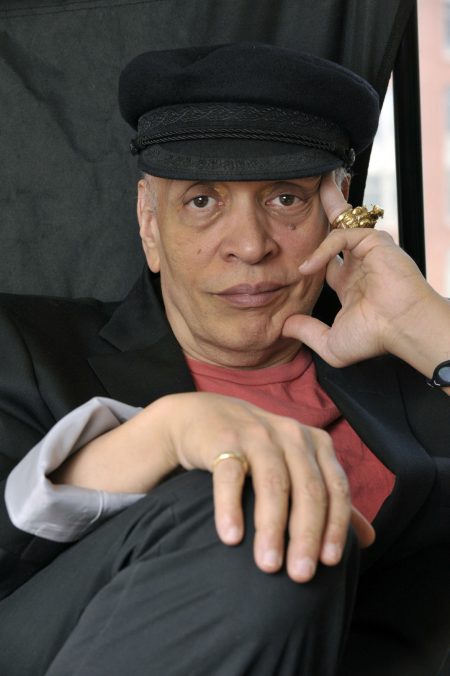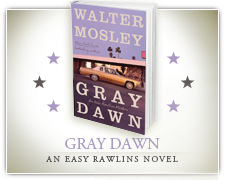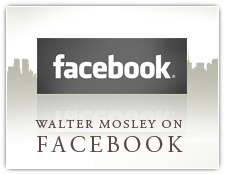A treasury of inspiration coming to the Alden, Feb. 24
by Hanan Daqqa / Fairfax County Times
February 22, 2019

The first time I discovered Walter Mosley was when I saw his photo on the front cover of the library’s catalog a few weeks ago. On the cover was an announcement about his upcoming event at McLean Community Center’s Alden Theatre, and I was intrigued by the look in his eyes and the title of the event: “From Generation to Generation: Stories of Fathers and Sons,” so I decided to find out more about him. I found an in-depth, three-hour-interview with him on C-SPAN as part of Book TV’s “In Depth.” I enjoyed every minute of it and I was really inspired. The 2018 interview introduced Mr. Mosley as “the author of over 40 books, including ‘Devil in a Blue Dress,’ ‘Fearless Jones,’ and most recently, ‘Down the River Unto the Sea.’” Currently, his most recent book is “John Woman.”
He is described by the McLean Community Center as “an NAACP Image Award-winning writer of mysteries and crime fiction, in 2016 Mosley was named Grand Master by the Mystery Writers of America (Edgar Award).”
My phone interview with Mr. Mosley was early at 8 a.m. Pacific Time based on his request (he lives in California) and my questions are reflection of his in-depth C-SPAN interview.
I would like to start with a statement by one of your readers, who said, “Your books are fiction, but they tell the truth.” Why do you want to tell the truth?
MOSLEY: Hmm (laughs) I don’t even know how to answer that question. A reader wrote, which I’m very happy about… I write fiction, and I think that most of my readers who read that fiction have an identity with it about a world that I’m writing about. The question would end up being, “Why do I write?” I like writing, and I love writing about the world that I know, and the world that I imagine. That’s about as far as I can go in answering that question.
Can you tell me more about your journey to publishing your books? It looks like it wasn’t smooth and easy.
MOSLEY: Well, actually, I don’t think it was very difficult. I had written a book, “Gone Fishin,’” and the publishers just couldn’t, you know, at that time, in the late eighties, they couldn’t figure out who would read the book, ‘cause they didn’t have a real understanding of a black reading audience, and a white reading audience about black people. So they couldn’t imagine publishing the book. But then I wrote the next book, “Devil in a Blue Dress,” and people were all excited: “Oh my God, a black detective!” La di da. It was interesting why people didn’t want to publish that book, the reasons, I think, were interesting.
But also, I heard from one of your interviews that you tried to publish certain books by selling them with other crime fiction books.
MOSLEY: People have put me in a box and they want me to write inside that box. They want me to write Easy Rawlins, and pretty much only that, Easy Rawlins, but, if it’s not Easy Rawlins, it’s one of my other detectives. The point is, I certainly have a problem with that. When it comes to my science fiction, literary, or whatever, they say no. That’s a problem, but it’s a problem that all writers have. Publishers, who used to be just people interested in literature, are now big corporations interested in making money. If you’re not writing a book that they think they can make a lot of money on, they’re not interested in it. That’s OK. So I go to another publisher.
Can you help me visualize what kind of a child you were?
MOSLEY: Hmm…I was an only child, and my mother was an only child, and my father was an orphan. My life was very solitary. I was very articulate, because the only people I had to talk to were my parents, they were, you know, adults. And because they didn’t really understand children from siblings, they bought me a television when I was very young, I was about 7 years old. I had my own room because I was an only child, and (laughs) I had my television. That’s kind of where I was. I lived in a world of imagination.
Wow. You talked about your mother, who is Jewish, and how she realized that she didn’t love her wealthy husband when she met your father, who is black. At the same time, you felt that she loved you very much, but didn’t show affection.
MOSLEY: Right, she didn’t know how to show affection.
So I wonder, was she happy with your father?
MOSLEY: Oh, yeah, very much so.
They were in love?
MOSLEY: Oh, yeah.
Wow.
MOSLEY: Because, you know, they’re adults. Adults have logic, “Oh, how do you feel?”
“I don’t feel good today. I can’t talk.” You don’t say that to a kid. But that’s the way my mother was. She was very distant from me, in expressing her emotions. But still, she loved me very much, and just couldn’t express.
How did you realize that she loved you?
MOSLEY: Oh, I didn’t realize that until much later. When I was a kid, what I felt was abandoned.
Oh, really?
MOSLEY: Oh, yeah.
How about your father?
MOSLEY: My father was very involved. He was a very passionate man. He cared very much about me. He was kind of crazy, so he punished me a lot, he would beat me and stuff. But hey, you know?
Listening to your interviews, I realized that you have two interesting sides: you are a visionary and you are inspiring. Let’s start with your visionary side and ask you about your vision for three things: police, capitalism and marriage.
Your book, “Down the River Unto the Sea,” is about police and institutionalized racism. I felt that you have a vision for how policing should be.
MOSLEY: Well, I mean, I think that that’s probably true. I’m not sure that if you asked, “How should the police do their job?” I don’t know if I could come up with a better answer than what’s already there, honestly. But you do begin to understand the limitations of the police in America. I’m not sure about other places, but in America, because America exists on a system of class. The people who are at the top of that system, the wealthiest people, they’re pretty much safe from the police and the courts and all that stuff. Then you have the people in the middle, who, maybe they’re getting treated fairly, maybe not. Then you have poor people, and poor people are treated badly. Some people who even look like poor people, like for instance (laughs), if you’re black, for a long time, this is the lowest class of people. These are people who come from slaves. The major job of policemen is to protect the property of the rich. That’s their job. They do other things: they solve murders, they stop public displays, but really, their job is to protect the property of the wealthy. That’s wrong. (laughs) My taxes are paying for the police, so why are they protecting someone else’s property?
Yeah.
MOSLEY: (laughs)
You also talked about how our role as citizens is to be aware in order to control capitalism so it will not leave us living paycheck to paycheck. Can you help me see how we can do that?
MOSLEY: There is something that is really simple. What you just said is true … if people understood that wealth is always finite because wealth is based on labor and labor is finite, that if anybody has an extra dollar, somewhere, somebody has one dollar less, if that became a truism for people, then the change would be automatic. One of the problems that people have in this world is that they just don’t understand the world they live in. Most people in America, for instance, if you ask them what class they are, they would say, “I am middle class,” but they are not. They are working class. Because they are working from paycheck to paycheck, as you said. They make a lot of money, you know, a hundred thousand dollars a year, maybe two of them, one hundred thousand each, but at the end of the year, they are flat broke. If they lose their jobs, you know, within a few weeks they are eating at McDonald’s, telling their kids that they should go to community college because they can’t afford life in America.
What is your vision for marriage? You don’t believe in institutional marriage.
MOSLEY: It’s not that I don’t believe in it. If I met somebody who is happily married, I would not say I don’t believe it. (laughs).My characters are not …
The nuclear family really worked well at one point. You had a farm. You had a little family business. You work hard and you support each other and you help each other, which no longer exists in capitalism. Each person has a job and more and more that is true that less and less an individual can start a company and that takes a lot of weight from the idea that marriage assures your future because that what it was originally. I don’t see this working the way it thinks it works. Now, two people can be married and be very much in love and very happy and they are going to stay together no matter what.
But you said other things in our life evolved, but marriage did not.
MOSLEY: When you have evolution of economics, which we are in the middle of, it changes the notion of what a union between two people is. You are together, you have children, but you can’t really decide how the children are going to be raised. The government decides how they are raised and educated, and how they will be part of the world, and things change so fast nowadays that parents have very little time for their children. Especially because they are working class, they can’t afford anything. I mean, if you’re rich and if you are a wealthy family like the Rockefellers, or the Kennedys or the Vanderbilts, the list goes on and on, you can afford that life. If you are just a working Joe, going to a big giant office every day, sitting at a long table with a whole bunch of other working Joes, your marriage is not going to make a great deal of a difference in that kid’s life.
Let’s talk about your inspiring side:
I would love to share your comments about reading with our audience. You said “reading is the closest thing to an active mind.” Believe me, when I heard the way you talked about reading, I became more determined to find a way to read all the time. So can you share your thoughts on reading?
MOSLEY: Before 1914, knowledge doubled every century. It took a hundred years for the number of things people knew to double, but then World War I happened. It doubled during World War I, and from then on it got faster and faster. Now, depending on who you read, knowledge doubles every ten months. Everything changes, how do you work, where do you work, what is expected of you and that’s kind of amazing, but the one thing that has not yet changed, maybe one day it will, is the way people exercise their mind. There are a few ways: you can work with somebody, you can love somebody, or you can read. When you read, it is your mind becoming active–also creative because you have to translate what you are reading into meaning in your mind and that is the most amazing thing. There is nothing else that does it. Movies don’t do it, music doesn’t do it, and speeches don’t do it.
I agree
MOSLEY: It is an amazing moment and most people don’t understand that because they can get information quicker in other ways. But still, reading is not about information. Reading is about thinking.
Wow. Yes. I love that. Also, you mentioned that poetry is the most important form of writing.
MOSLEY: Well, it is the most basic. If you can understand what writing poetry is, you can write anything. You can write screenplays, you can write plays, you can write novels, short stories.
Poetry is about condensation, it is about metaphors and similes. It is about the music of language. It is about using exactly the right word as well as you might know it. It’s really kind of wonderful. 20:00
Did you write poetry?
MOSLEY: I studied it, but I was never good at it.
You have a book about writing a novel. It’s called “This Year You Write Your Novel.” You shared that for people who really want to write, they have to try the 100-day challenge as a starting point.
MOSLEY: The active writing is a lot about psychoanalysis. What you do is, you write one hour, or two or three every day, and when you finish, that’s it, you are finished. Then the next day, when you wake up, you realize, “Oh, all of a sudden, all these things are in my mind because like psychoanalysis, it kind of excites the unconscious.” If you write everyday — and I mean every day, Monday through Sunday, whether you are on vacation, whether you are sick, whether you’re home, wherever–you get deeper and deeper into yourself. The more deeply you get into yourself, the more you understand what the subject of your life is.
I have a good friend, who has great stories to tell, but he was not telling them, and I finally convinced him to “just do it every day for a hundred days, and see what happens,” and now he is deeply into this memoir, which is fantastic. I love it.
Not everybody can do it, but if you can, those 100 days will tell you whether you can’t or you can.
Walter Mosley’s books will be available for sale and signing after his talk, “From Generation to Generation: Stories of Fathers and Sons,” which is presented by The Alden in partnership with the Fairfax County Public Library, on Sunday, Feb. 24 at 2 p.m.





